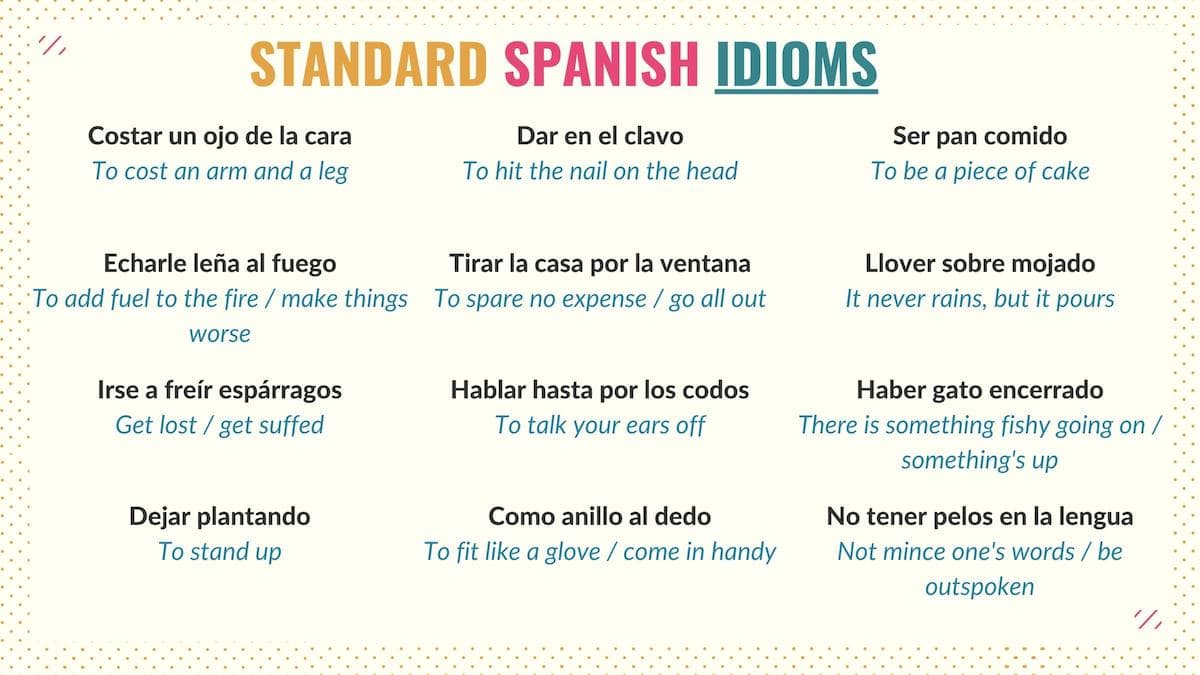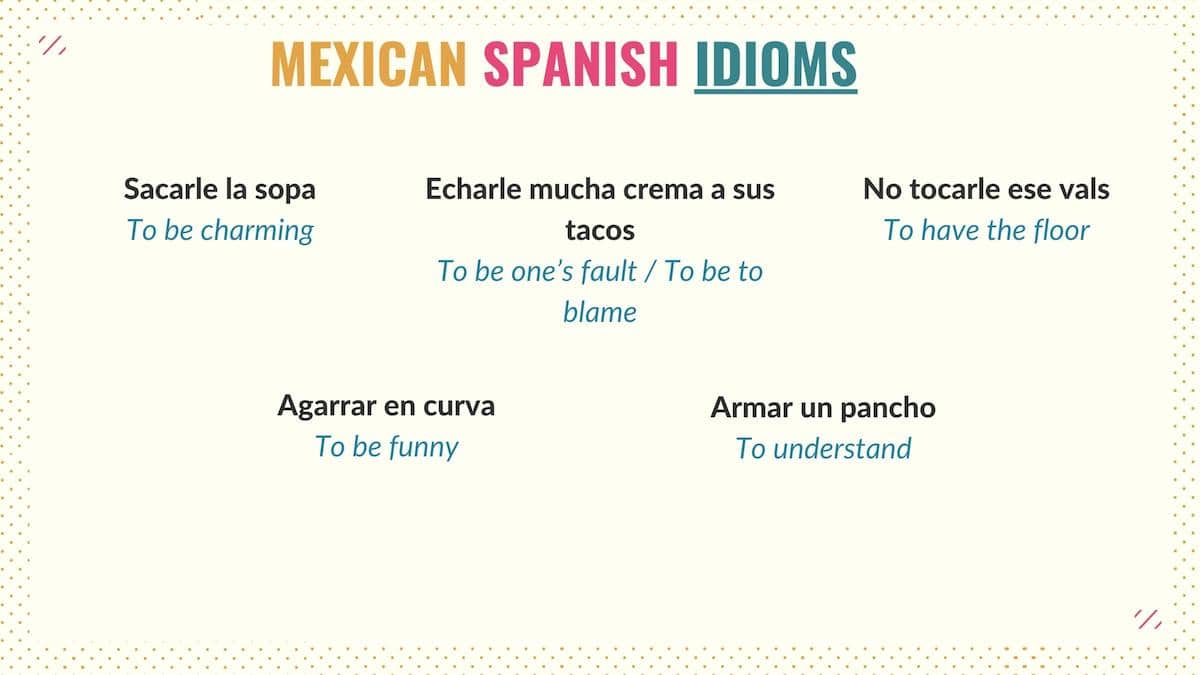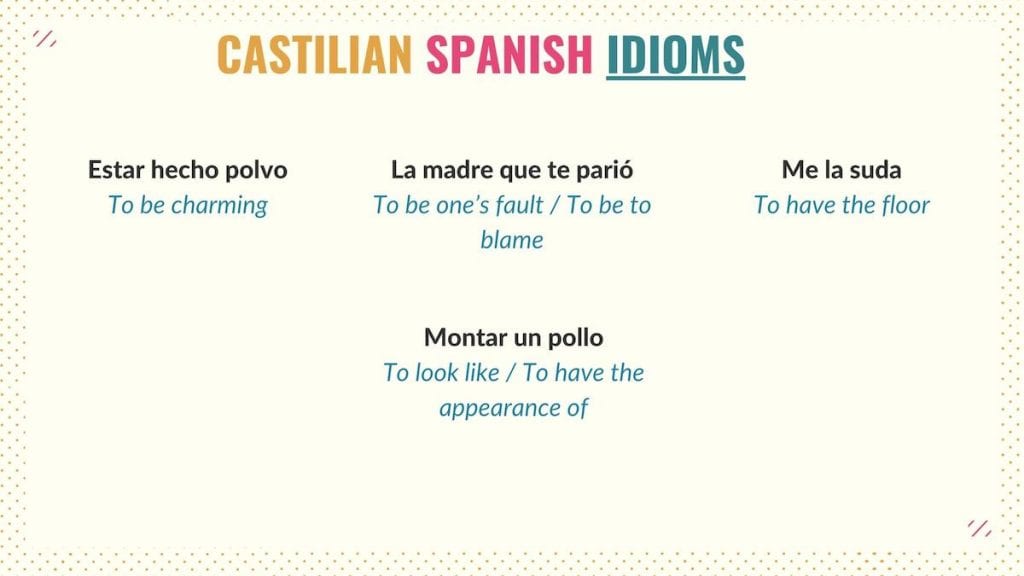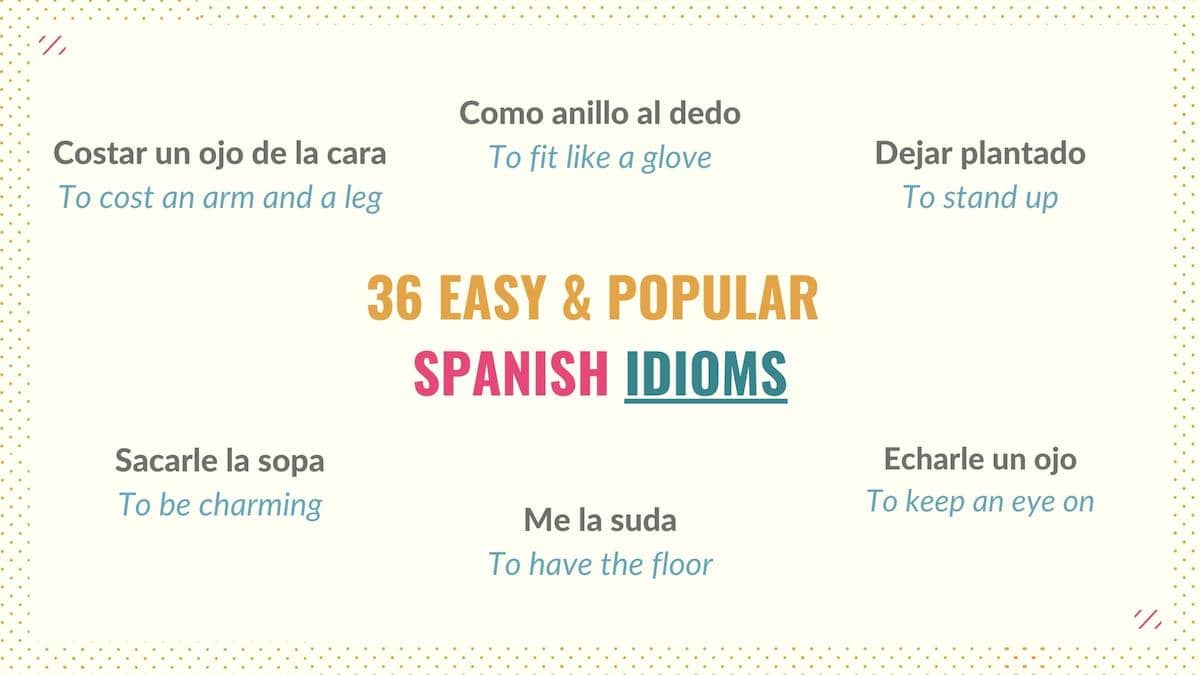Spanish idioms are phrases that help you convey your ideas more concisely and effectively. So, if you’re learning Spanish, idioms are necessary to improve your communication skills (comprehension and speaking).
To point you in the right direction, in this article, I’ve compiled 36 popular idioms in Spanish. You’ll also find a short description and examples, so you know how to use these phrases.
- 27 Standard Spanish Idioms
- 5 Mexican Spanish Idioms
- 4 Castilian Spanish Idioms
- Wrapping Up & Download Spanish Idioms PDF
As you’ll see, I’ve listed each phrase with verbs in their infinitive form. So, you’ll see the examples use different Spanish pronouns and verb conjugations based on the context in which each expression is being applied.
Let’s start, shall we?
Tip: There are hundreds of Spanish idioms. But, as I explain in my “Hacks to Learn Spanish” resource (included in the Spanish Learning Kit), you should focus on learning vocabulary you’ll actually use. Things like movies, songs, and TV shows in Spanish are great tools if you’re looking to learn more idioms.
27 Standard Spanish Idioms

1. Costar un ojo de la cara
Costar un ojo de la cara means that something is very expensive. This can be a financial cost, but it can also refer to the effort and sacrifice someone made to obtain something. This Spanish idiom is the direct translation of ‘to cost an arm and a leg’.
La universidad cuesta un ojo de la cara.
College costs an arm and a leg.
Es un buen teléfono, pero me costó un ojo de la cara.
It’s a good phone, but it cost me an arm and a leg.
Tip: Costar un riñón is a more informal variation of ‘costar un ojo de la cara’. It usually refers to a financial cost.
2. Dar en el clavo
In Spanish, dar en el clavo expresses that someone gave the right answer or guessed something correctly. It means ‘to hit the nail on the head’.
Juan dio en el clavo con su respuesta.
Juan hit the nail on the head with his answer.
La neta diste en el clavo: sí estoy un poco preocupado.
The truth is that you hit the nail on the head: I’m a bit worried.
3. Ser pan comido
The Spanish idiom ser pan comido is used to say that something is very easy to do. It can be translated as ‘to be a piece of cake’ or ‘easy-peasy’.
Andar en bicicleta es pan comido.
Riding a bike is a piece of cake.
El examen fue pan comido.
The test was easy-peasy.
4. Echarle leña al fuego
Echarle leña al fuego implies that someone is making a situation worse by saying or doing something. So, this Spanish idiom means ‘to add fuel to the fire’ or ‘to make things worse’.
¡No digas nada! ¿Para qué le echas leña al fuego?
Don’t say anything! Why make things worse?
No le hagas caso, Luis sólo quiere echarle leña al fuego.
Don’t listen to him. Luis only wants to add fuel to the fire.
Take Note: This idiom works with Spanish indirect pronouns. You must place these pronouns before a conjugated verb or attach them to a verb in infinitive form.
5. Tirar la casa por la ventana
When talking about parties and celebrations, this idiom conveys that someone spent a lot of money. Tirar la casa por la ventana is close in meaning to ‘spare no expense’ or ‘to go all out’.
Miranda y Leo tiraron la casa por la ventana en su boda.
Miranda and Leo went all out on their wedding.
¡Qué bonitas decoraciones! Se ve que tiraron la casa por la ventana.
Such beautiful decorations! You can see that they spared no expense.
6. Llover sobre mojado
When more than one bad thing happens to you simultaneously, you can use the Spanish idiom llover sobre mojado to describe this situation. This expression means ‘it never rains, but it pours’.
| Spanish | English |
|---|---|
| Ayer perdí mis llaves y hoy mi cartera. | Yesterday, I lost my keys, and today my wallet. |
| ¡No manches, te llueve sobre mojado! | Geez, it never rains, but it pours! |
7. Irse a freír espárragos
Irse or mandar a alguien a freír espárragos is a phrase Spaniards use to ask an annoying person to leave them alone. These expressions are close in meaning to ‘get stuffed’ or ‘get lost’.
Karla, vete a freír espárragos, tía.
Karla, get lost, dude.
¿En serio te dijo eso? Mándalo a freír espárragos.
Did he actually say that? Tell him to go get stuffed.
8. Hablar hasta por los codos
Hablar hasta los codos is used to describe people who talk too much. It means ‘to talk your ears off’.
No inventes, Cindy habla hasta por los codos.
Jeez, Cindy talks your ears off.
9. Dar la vuelta a la tortilla
This Spanish phrase is used to say that a situation has changed around or reversed. Dar la vuelta a la tortilla is close in meaning to ‘turn the tables’.
Íbamos perdiendo, pero le dimos vuelta a la tortilla.
We were losing, but we turned the tables.
Alice siempre le da vuelta a la tortilla y yo termino pidiendo perdón.
Alice always turns the tables, and I end up saying sorry.
10. Pedir peras al olmo
Pedir peras al olmo is a beautiful Spanish idiom that expresses that someone is asking for something impossible or very difficult to do. It’s close in meaning to “reach for the moon” or “make a silk purse out of a pig’s ear”.
| Spanish | English |
|---|---|
| ¿Crees que Juan llegue temprano? | Do you think Juan will arrive early? |
| ¡Le pides peras al olmo! | You can make a silk purse out of a pig’s ear. |
Take Note: This idiom is built with an easy Spanish metaphor. Un olmo (an elm tree) cannot produce pears (peras) – it’s impossible in nature! It’s the same idea when you ask someone to do something impossible for them.
11. Como anillo al dedo
When we want to say that a thing or situation is suitable or convenient for us, we can use the phrase como anillo al dedo, which means ‘fit like a glove’ or ‘come in handy’.
Este dinero me viene como anillo al dedo.
This money comes in handy.
Los zapatos te quedan como anillo al dedo.
The shoes fit you like a glove.
12. No tener pelos en la lengua
No tener pelos en la lengua means that someone speaks to the point and without being subtle. So, it’s close to ‘not mince your words’ or ‘be outspoken’.
¡Qué groseros son! ¿No tienen pelos en la lengua?
You guys are so rude! Don’t you mince your own words?
13. Echarle un ojo
In Spanish, echarle un ojo is used to ask someone to:
- Keep an eye on someone or something
- Look briefly at something
As a result, this idiom means ‘to take a quick look’, ‘to watch’ or ‘to keep an eye on’.
Marta, ¿le echas un ojo a los niños?
Marta, can you keep an eye on the children?
Échale un ojo a esta propuesta.
Take a quick look at this proposal.
14. Importar un pepino
To say that you don’t care about something in Spanish, you can use the expression importar un pepino or it’s variations:
- Importar un cacahuate
- Importar un bledo
- Importar un comino/pimiento
A mí me importa un pepino lo que tú pienses.
I couldn’t care less about what you think.
15. Tomar el pelo
In Spanish, tomar el pelo is used to express that someone is tricking or mocking another person. It means to ‘play for a fool’ or ‘pull someone’s leg’.
No trates de tomarme el pelo que te conozco.
Don’t try to play me for a fool, I know you.
16. Dar gato por liebre
Dar gato por liebre describes a scam or form of deception where someone receives a low-quality product or service. This idiom is close in meaning to ‘trick’, ‘to be ripped off’, or ‘pull the wool over someone’s eyes’.
Compré este celular y ya se descompuso. Me dieron gato por liebre.
I bought this phone, and it already broke. They pulled the wool over my eyes.
17. Ser uña y carne
Ser uña y carne, or ser uña y mugre, implies that two people are inseparable. This phrase is equivalent to the translation of ‘be joined at the hip’.
Mi hermana y mi prima son como uña y carne.
My sister and my cousin are joined at the hip.
18. Tener en la punta de la lengua
When you cannot remember a name or a word, you can use the Spanish idiom tener en la punta de la lengua, which means ‘be on the tip of your tongue’.
¿Cómo se llama? ¡Lo tengo en la punta de la lengua!
What is it called? It’s on the tip of my tongue!
Tip: When referring to a person or animal, llamarse is translated as ‘to be named’ (my name is). However, this verb can mean ‘to be called’ when talking about the name of a thing or place.
19. Llevar las de perder
Llevar las de perder implies that someone is in a losing position or has a significant disadvantage in a situation. This expression means ‘to stand to lose’ or ‘be in a bad position’.
Cecilia lleva las de perder en este proyecto.
Cecilia stands to lose in this project.
20. Meter la pata
Meter la pata is used to say that someone did or said something inappropriate. So, this Spanish idiom is close in meaning to ‘step in it’, ‘make a mistake’, or ‘mess up’.
¡Ay! ¿No sabías? Perdón, ya metí la pata.
Oh, you didn’t know? Sorry, I really stepped in it.
21. Írsele la mano
Írsle la mano is a popular phrase in Spanish that we use to express that someone lost control and went too far. This idiom is close in meaning to ‘get out of hand’ or ‘go too far’.
Creo que se me fue la mano con Laura.
I think I went too far with Laura.
22. Haber gato encerrado
In Spanish, haber gato encerrado expresses suspicion about a situation. As a result, this phrase is close in meaning to ‘there is something fishy going on’ or ‘something’s up’.
Esto está raro, aquí hay gato encerrado.
This is weird; there’s something fishy going on.
23. Dejar plantado
Dejar plantado is an informal phrase to say that someone didn’t show up to a date or appointment and left someone else waiting. It’s the direct translation of ‘to stand up’.
La novia de mi hermano lo dejó plantado.
My brother’s girlfriend stood him up.
Take Note: Plantado is a Spanish past participle adjective. Therefore, it must agree with the gender and number of the person you’re talking about.
24. Ponerse las pilas
Ponerse las pilas compels people to do their best to do an activity. This Spanish expression is close in meaning to ‘pull your socks up’.
Si no te pones las pilas, te van a despedir.
If you don’t pull your socks up, you’re going to get fired.
25. Ser tal para cual
To express the similarity between two people, you can use the idiom ser tal para cual, which means ‘cut from the same cloth’.
¡Qué bárbaros, estos dos son tal para cual!
Jeez, these two are cut from the same cloth!
26. Ser la cereza del pastel
Like its English counterpart ‘be the cherry on the cake’, ser la cereza (guinda) del pastel expresses that something good made things even better.
Conseguir un aumento fue la cereza del pastel.
Getting a raise was the cherry on the cake.
27. A caballo regalado no se le ve el diente
This Spanish phrase expresses that you cannot look for flaws in something you obtained for free. It means “don’t look a gift horse in the mouth”.
| Spanish | English |
|---|---|
| Oye, la pantalla que me diste tiene muchos rayones. | Hey, the screen you gave me has many scratches. |
| Oye, a caballo regalado no se le ve el diente. | Hey, don’t look a gift horse in the mouth. |
5 Mexican Spanish Idioms

28. Echarle mucha crema a sus tacos
Echarle crema a sus tacos is an informal Mexican idiom. It implies that someone exaggerates an action or achievement. This expression is close in meaning to ‘exaggerate’, ‘talk big’, or ‘blow your own horn’.
Güey, cómo te gusta echarle crema a tus tacos.
Dude, you love talking big about yourself.
Regina siempre le echa mucha crema a sus tacos.
Regina always blows her own horn.
Take Note: With this idiom, Spanish possessive adjectives are used to express who is exaggerating.
29. Sacarle la sopa
To say that you’ve got the truth out of someone, you can use the Mexican idiom sacarle la sopa. In other, this expression implies that you obtained the whole story about a certain situation. This expression is close to ‘to make someone spill the beans’ or ‘to get the truth’.
[Indirect object pronoun] + [sacar conjugated] + la sopa
Perdón, mi mamá me sacó la sopa.
Sorry, mom made me spill the beans.
No supe qué pasó con Abby, pero al rato le saco la sopa.
I didn’t hear what happened with Abby, but I’ll get the truth out of her later.
30. No tocarle ese vals
No me toquen ese vals is a funny idiom Mexicans use to ask someone to not remind them or stop talking about a sensitive topic.
| Spanish | English |
|---|---|
| Oye, ¿a poco terminaste con Alicia? | Hey, did you really break up with Alicia? |
| ¡No me toques ese vals, güey! | Don’t remind me about that, dude! |
31. Agarrar en curva
Agarrar en curva is a popular idiom that means that something or someone ‘took you by surprise or ‘caught you off guard’.
[Direct object pronoun] + [agarrar conjugated] + en curva
No tengo idea, la verdad, me agarraste en curva.
I have no idea, to be honest. You caught me off guard.
32. Armar un pancho
Armar un pancho is a funny Mexican idiom that we use to say that someone is being dramatic or making a fuss about something. Some variations of this idiom are:
- Hacer un pancho
- Armar un lío (Castilian Spanish)
- Montar un pollo (Castilian Spanish)
Katia me armó un pancho por su celular.
Katia made a big fuss because of her phone.
4 Castilian Spanish Idioms

33. Estar hecho polvo
In Castilian Spanish, estar hecho polvo is a common phrase to say that someone is physically or emotionally exhausted. This expression means ‘to be exhausted’ or ‘to be worn out’.
Vamos mañana, estoy hecho polvo.
Let’s go tomorrow. I’m exhausted.
34. La madre que te parió
La madre que te parió is a common and informal idiom in Castilian Spanish. This phrase is used to express anger or surprise. It’s similar in meaning to ‘what the heck?’, ‘holy cow’ or ‘damn’.
¡La madre que te parió! Pero, ¿qué haces?
Holy cow! What are you doing?
35. Me la suda
In Castilian Spanish, me la suda is an informal and coarse way to say that you don’t care about something.
Lo que piensen tus amigos me la suda.
I don’t care what your friends think.
36. Montar un pollo
If you’re learning Castilian Spanish and want to say that someone is making a scene or a fuss, you can use the informal idiom montar un pollo.
Ana me ha montado un pollo porque le dije que no podía ayudarla.
Ana made a fuss because I told her that I couldn’t help her.
Wrapping Up & PDF Cheat sheets
Learning idioms in Spanish is essential if you’re serious about taking your command of the language to the next level. Now that you know some of the most common expressions, it’s time for you to start applying them in your conversations!
Download a copy of Spanish Idioms to come back to and study at your own pace!



